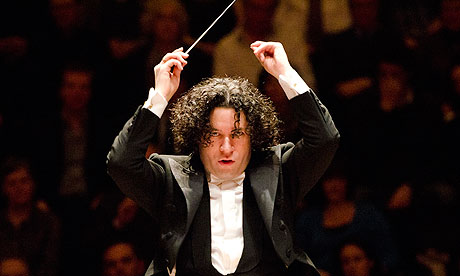G.Dudamel and the LA Phil. in London [音楽時評]
このLondon, The Guardian 紙のReview は,Gustavo Dudamel has been controversial of late. とLosangels Philharmonic のMusic Director に華々しく迎えられてから一定の期間が過ぎて,さまざまに評価が分かれてきたと書き起こしています.He has long been a star, and rightly so, thanks to his association with the tremendous impact made by the Simón Bólivar Youth Orchestra from his native Venezuela. Yet away from the Bólivars, things have been more equivocal.
彼は2012年までスエーデンのthe Gothenburg Symphony のprincipal conductorですが,彼の指揮への賞賛は聴かれなくなっているそうですし,ロスフィルでthe so-called "Dudamania" と呼ばれた熱烈なフアンもdied down したそうです.
そして,アメリカで,Dudamel が誇大宣伝された指揮者の評価に答えられるかどうかに疑問が提起されているといわれます.
ロスフィルは,signed up as Barbican international associates,の契約を結んだそうですから,London では彼の指揮を聴く機会がこれから増えることになります.そのOpen ninaruコンサートには文化大臣culture secretary Jeremy Hunt も聴衆に加わったそうです.
プログラムは, Adams's Slonimsky's Earbox, Bernstein's First Symphony and Beethoven's Seventh だったそうです.
Adams の曲は,Stravinsky のPetrushka に近い響きを持っていたそうですが,it showcases the LAP's dexterity and precision, and nicely emphasises their sound's innate glamour – warmer than some US orchestras, とアメリカのオケとしてユニイークで優れた音響を響かせていたといいます. Dernstein の曲は第2次大戦中の1942年に書かれ,"Jeremiah" とタイトル曲で,a dark meditation on Jewish spirituality at a time of threat という背景を持った曲だそうですが,Dudamel は,賢明にも,centred the work in its scherzo, with its collisions between mockery and violence. Kelley O'Connor, tall and hieratic, was the alto soloist, intoning the final lament with sepulchral beauty となかなかの好演を示したようです.
Deethoven 7thは,素晴しい演奏だったようで,the Beethoven was electrifying. Dudamel used almost unfashionably large forces by UK standards, but controlled them superbly throughout. Textural complexity was balanced by tremendous grace of phrasing and the instrumental solos were often exquisitely played. The slow movement, opening in a mood of profound sadness, gradually acquired a relentless momentum as it progressed that took it into troubling, curiously disconsolate emotional territory. Dudamel took the finale so swiftly that occasional details vanished in the exaltation of it all. It was impossible not to be swept away. That visceral quality that made him so famous with the Bólivars was present in his Beethoven in spades.
といかにもDudamel らしさを存分に発揮した好演だったようです.
あとは,ご自由にご渉猟下さい.
Gustavo Dudamel and the LA Philharmonic – review
The Barbican, London

- The Guardian, Friday 28 January 2011

Gustavo Dudamel conducts the Los Angeles Philharmonic at the Barbican in London Photograph: Tristram Kenton
Gustavo Dudamel has been controversial of late. He has long been a star, and rightly so, thanks to his association with the tremendous impact made by the Simón Bólivar Youth Orchestra from his native Venezuela. Yet away from the Bólivars, things have been more equivocal. Responses to his performances with the Gothenburg Symphony – he is their principal conductor until 2012 – have been, on occasion, muted. And once the so-called "Dudamania" over his musical directorship of the Los Angeles Philharmonic died down, questions began to be asked in the US both about his musicianship and if any conductor, even of the highest calibre, could live up to the hype surrounding him.
The LAP, however, have now signed up as Barbican international associates, so we are going to have plenty of opportunity to assess Dudamel's ongoing relationship with them and his development as an interpreter. And on this showing, the auspices are good, by and large making those dissenting voices seem querulous and tetchy. The opening concert, attended by luminaries from the arts world including culture secretary Jeremy Hunt, was an almost self-consciously grand occasion.
Its programme consisted of three works – Adams's Slonimsky's Earbox, Bernstein's First Symphony and Beethoven's Seventh – that are rooted in tense rhythmic complexities and dynamic extremes. This is the sort of thing Dudamel has always done well.
Slonimsky's Earbox peers back towards minimalism's roots in Stravinsky with the result that some of it sounds too like Petrushka for its own good. But it showcases the LAP's dexterity and precision, and nicely emphasises their sound's innate glamour – warmer than some US orchestras, albeit with a slight glare in the brass. Bernstein's First, meanwhile, subtitled "Jeremiah" and written in 1942, is a dark meditation on Jewish spirituality at a time of threat. The gaunt, thudding opening soon headed implacably towards climaxes that oppressed through sheer force of decibels. Dudamel centred the work, however, in its scherzo, with its collisions between mockery and violence. Kelley O'Connor, tall and hieratic, was the alto soloist, intoning the final lament with sepulchral beauty, if occasional unsteadiness.
But the Beethoven was electrifying. Dudamel used almost unfashionably large forces by UK standards, but controlled them superbly throughout. Textural complexity was balanced by tremendous grace of phrasing and the instrumental solos were often exquisitely played. The slow movement, opening in a mood of profound sadness, gradually acquired a relentless momentum as it progressed that took it into troubling, curiously disconsolate emotional territory. Some might have preferred more differentiation between the contrasting speeds of the scherzo and trio, and Dudamel took the finale so swiftly that occasional details vanished in the exaltation of it all. It was impossible not to be swept away. That visceral quality that made him so famous with the Bólivars was present in his Beethoven in spades.



